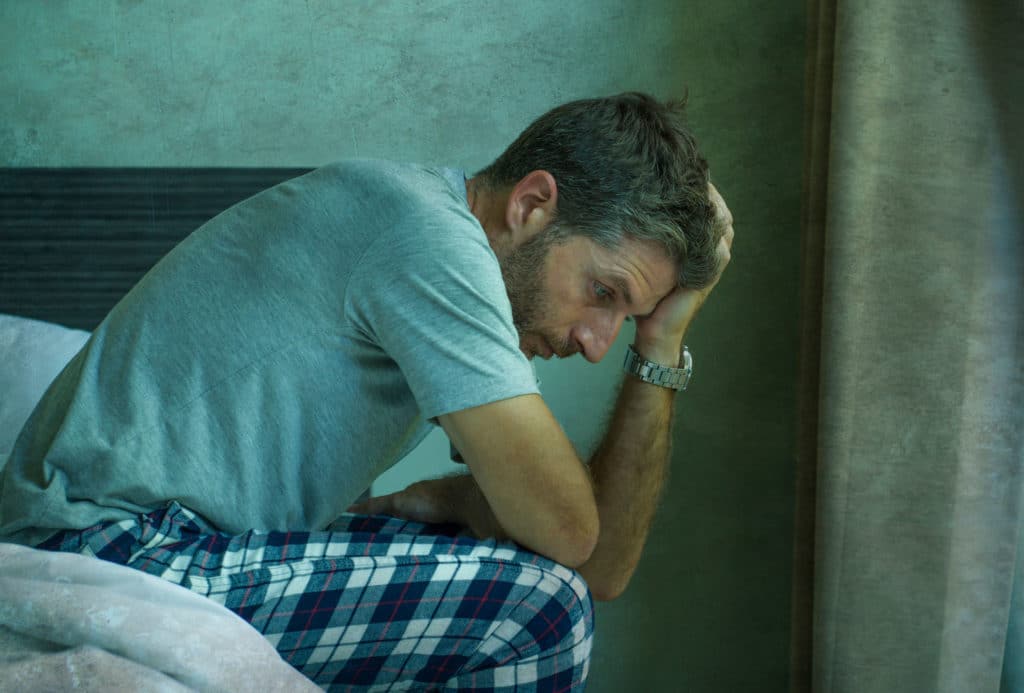anxiety and addiction
Anxiety disorders are prevalent emotions experienced by many individuals during their lifetime. These feelings of tension, worried thoughts, and associated symptoms, like high blood pressure, can arise and then subside. Anxiety can emerge in various situations, such as before a date with a new person, when traveling by plane, or when asking for a raise from one’s boss. It is a natural response to uncertain or unfavorable outcomes.
While anxiety is typically temporary, it may not always be so for some people who find themselves frequently struggling with anxiety. Persistent anxiety could indicate an anxiety disorder, which can significantly impact a person’s ability to engage in their daily life. In such cases, individuals might attempt to cope with their anxious feelings through less-than-ideal methods.
Sometimes, anxiety and substance abuse issues co-occur. As individuals seek ways to manage anxiety independently, they may discover that drugs or alcohol provide temporary relief from intense emotions. However, relying on substances like drugs or alcohol over time can lead to dependence on these substances.
If you find yourself facing both anxiety disorders and anxiety-related substance abuse, consider seeking dual-diagnosis treatment at Eagle Creek Ranch Recovery in Nampa, Idaho.
Dual diagnosis treatment entails the treatment of two disorders at once. These can be two mental health conditions or a mental health condition and substance use disorder. This type of treatment is best suited for those who struggle with the presence of co-occurring disorders—another name for having two disorders at once.
These disorders can range from mild to severe and often affect the individual’s quality of life in a major way. To ensure that an individual in treatment is given the best chance at recovery, both disorders must be treated at once. In this program, both behavioral health conditions are diagnosed and taken into consideration when your unique treatment plan is being created.
When an individual has two conditions at once, they may influence the severity of each other. Both conditions must be identified and treated for the individual to experience relief. Unfortunately, if one condition is ignored, there is an increased chance of relapse as the person will be unable to fully manage their symptoms.
Contact Eagle Creek Ranch Recovery
Today!
Why Wait? Find The Help You Need By Reaching Out To Us Today! Our Admissions Team Is Standing By.
WHAT IS AN ANXIETY DISORDER?
The Diagnostic and Statistical Manual defines anxiety disorders as a category of mental disorders characterized by excessive fear or anxiety that is difficult to control and negatively impacts an individual’s daily life. Anxiety disorders involve excessive, persistent, and often irrational worry or fear about future events or situations. These feelings are typically disproportionate to the actual threat posed by the situation and can lead to significant distress or impairment in various areas of functioning.
When an individual has an anxiety disorder, their feelings of panic will interfere with daily activities. Another hallmark of an anxiety disorder is that the terror often will not match the danger that the person is facing. For example, a person with an anxiety disorder may have a panic attack when faced with a seemingly normal situation such as mailing a letter at the post office. This then causes them to avoid situations where they experience intense anxiety, leading to a disruption in their everyday life.
Anxiety disorders are persistent and the symptoms of an anxiety attack can last a long time. For many people, these disorders begin in childhood or when they are in their teenage years and then persist into their adult lives. However, an anxiety disorder can begin at any stage in life and may be due to a traumatic experience that facilitates the start of one.
THE SIGNS AND SYMPTOMS OF ANXIETY
Anxiety, like other health conditions, comes with common signs and symptoms. However, all anxiety disorders come with some combination of the following signs:
- Involuntary anxious thoughts or beliefs that interfere with daily life and do not go away or get better over time.
- Physical symptoms related to feelings of terror or panic.
- Behavioral changes cause you to avoid certain stimuli or scenarios.
Since there are different types of anxiety disorders, there is a range of symptoms that one may experience. These symptoms may include any combination of physical or psychological symptoms:
- Feeling nervous, restless, or tense
- The presence of a sense of impending danger, panic, or doom
- Increased heart rate
- Hyperventilation or rapid breathing
- Sweating
- Trembling
- Feelings of weakness or fatigue
- Difficulty concentrating or thinking about anything other than the present worry
- Having trouble sleeping
- Gastrointestinal (GI) problems such as upset stomach
TYPES OF ANXIETY DISORDERS
While anxiety refers to a feeling of unease and panic, anxiety disorders refer to a condition that involves more than temporary feelings of anxiety. These disorders progress over time and may get worse without treatment. This often causes problems for the sufferer with school, work, relationships, and daily life.
There are a variety of anxiety disorders that a person can have. These differ in the presentation of symptoms and what triggers the anxiety. The following are common anxiety disorders that may accompany a substance use disorder:
GAD is the most common type of anxiety disorder. An estimated 5.7% of adults in the United States experience some type of anxiety disorder in their lifetime. When a person suffers from generalized anxiety disorder (GAD), they experience excessive worry and anxiety about activities and life events. These activities and life events may even be ordinary. Regardless, they instill feelings of worry in the individual.
The worry associated with anxiety is often impossible to control and causes physical stress such as rapid heart rate, hyperventilation, or sweating. Anxiety disorder often co-occurs with other conditions, such as clinical depression.
A panic disorder is distinguished by the presence of panic attacks. Panic attacks are episodes of intense panic in which anxiety reaches a peak. During a panic attack, an individual will experience feelings of impending doom accompanied by chest pain, shortness of breath, and heart palpitations. Panic attacks are highly uncomfortable and will often result in a person avoiding situations that cause them.
When a person has a social anxiety disorder, they become overwhelmed with anxiety when they are in social situations of any kind. This anxiety can manifest itself as fear of being judged, fear of rejection, or fear of embarrassment. People with a social anxiety disorder will often feel anxious and uncomfortable even when the situation doesn’t warrant it. For example, when checking out in the grocery store, the prospect of engaging with a cashier can cause unwanted feelings of anxiety and panic.
There are times when anxiety develops due to the use of substances like drugs or alcohol. A substance-induced anxiety disorder will be accompanied by feelings of intense anxiety when an individual is exposed to drugs or during withdrawal from their drug of choice.
Specific phobias are also categorized as anxiety disorders. Phobias are intense anxiety that’s experienced when a person is exposed to a certain feared object or situation. An individual who has a fear of water, flying, or anything else, may experience anxiety and panic attacks if they are placed in a position to confront their fear. For example, someone with agoraphobia will experience intense anxiety if faced with a crowded place or a place that is difficult to leave.
Co-Occurring Anxiety and Other Disorders
The co-occurrence of anxiety with other disorders is a common and complex phenomenon in the realm of mental health. Individuals facing anxiety often experience its simultaneous presence with various conditions, such as substance abuse and depression. Understanding these intricate relationships is crucial for developing effective treatment approaches that address the interconnected challenges of co-occurring disorders.
Anxiety and substance abuse commonly occur together. Individuals suffering from anxiety disorders often resort to self-medication with drugs or alcohol, especially if they haven’t received a formal diagnosis or are avoiding seeking treatment. Unfortunately, drugs and alcohol may provide temporary relief from the physical and emotional symptoms associated with anxiety.
While using drugs or alcohol can offer short-term anxiety relief to many individuals, it can quickly escalate into a problematic situation. Moreover, the coexistence of anxiety and addiction may exacerbate the severity of each condition. As a person experiences the repercussions of drug abuse, their anxiety levels may intensify, creating a harmful cycle of heightened emotions and the consequences of substance abuse.
One common self-medication practice for anxiety is using alcohol to cope with social anxiety, often referred to as a “social lubricant.” However, this can lead to alcohol abuse, as the individual becomes dependent on alcohol to interact with others. When situations like these arise, it becomes necessary for the individual to receive dual diagnosis treatment to address both anxiety and addiction effectively. You can get addiction treatment in Idaho at Eagle Creek Ranch Recovery.
The association between anxiety and depression is a well-established phenomenon in the field of mental health. These two conditions often coexist and can interact in complex ways, presenting significant challenges for those who experience them. Individuals with anxiety disorders frequently encounter symptoms of excessive worry, fear, and nervousness, while those with depression often struggle with persistent feelings of sadness, hopelessness, and low energy.
One reason for this anxiety and depression association is the shared underlying neurobiological factors. Both anxiety and depression involve disruptions in certain neurotransmitters, such as serotonin, norepinephrine, and dopamine, which play crucial roles in regulating mood and emotions. Imbalances or fluctuations in these neurotransmitters can contribute to the development of anxiety and depression, leading to overlapping symptoms and experiences.
Anxiety and depression share common behavioral patterns and thought processes. Negative thought patterns are prevalent in both conditions. These negative cognitive patterns can reinforce each other, creating a cycle that exacerbates both anxiety and depression. Because of the anxiety and depression associated with addiction, it’s crucial to seek treatment for mental illnesses. At Eagle Creek Ranch Recovery we treat anxiety and addiction, and any other mental disorders that co-occur.
TREATING ANXIETY AND ADDICTION
The treatment for anxiety and addiction at Eagle Creek Ranch Recovery begins with a thorough assessment of each individual’s unique needs and experiences. This process allows the team of professionals to create a tailored and individualized treatment plan. By addressing both underlying issues at once, individuals can gain valuable insights into how their anxiety and addiction are interconnected.
Our dual-diagnosis treatment program addresses a variety of psychiatric disorders that co-occur with substance use disorder, including post-traumatic stress disorder (PTSD), depression, bipolar disorder, schizophrenia, and personality disorders. We offer inpatient treatment as well as outpatient treatment, both of which include therapeutic interventions in the treatment process.
One of the core components of dual diagnosis treatment at Eagle Creek Ranch Recovery is psychotherapy. This therapeutic approach provides a safe and supportive environment for individuals to process their anxiety disorder experience and addiction struggles. Therapists not only offer psychoeducation about anxiety and addiction but also extend emotional support to help individuals learn effective coping skills for their symptoms.
- Individual Therapy: Individual therapy involves one-on-one sessions between the therapist and the client. It provides a safe and confidential space for individuals to explore their anxiety and addiction issues, gain insight, and develop coping strategies.
- Group Therapy: Group therapy for substance abuse and anxiety involves a therapist leading a session with a small group of individuals facing similar challenges. It offers a supportive environment for sharing experiences, learning from others, and developing interpersonal skills. A group setting can enable individuals to work through a social anxiety disorder.
- Cognitive-Behavioral Therapy (CBT): Cognitive-behavioral therapy is a structured therapy that focuses on identifying and changing negative thought patterns and behaviors. It helps individuals challenge and modify unhelpful beliefs, reducing anxiety and addressing addictive behaviors.
- Dialectical Behavior Therapy (DBT): Dialectical behavior therapy combines elements of CBT with mindfulness techniques. It teaches individuals to regulate emotions, cope with stress, and improve interpersonal relationships, making it effective for anxiety and addiction treatment.
- Family Therapy: Family therapy involves the whole family unit, working together to address anxiety and addiction issues. It fosters open communication, resolves conflicts, and enhances family support for the individual in treatment.
- Motivational Interviewing: Motivational Interviewing is a client-centered approach that helps individuals explore and resolve their ambivalence about change. It encourages intrinsic motivation to overcome anxiety and addiction by highlighting personal values and goals.
By integrating various therapeutic modalities and addressing both anxiety and addiction, Eagle Creek Ranch Recovery provides a comprehensive and holistic approach to dual diagnosis treatment. With the support of experienced professionals and evidence-based interventions, individuals can begin their journey toward lasting recovery and improved mental well-being.
In cases where medication is deemed appropriate and necessary, the medical team at Eagle Creek Ranch Recovery may prescribe selective serotonin reuptake inhibitors (SSRIs) or other medications. SSRIs are prescription medications commonly used to treat anxiety disorders by increasing serotonin levels in the brain, promoting a more balanced mood, and reducing anxiety symptoms.
Medication is also used for drug and alcohol addiction treatment. Medication can alleviate withdrawal symptoms and curb cravings. For example, Disulfiram helps treat alcohol dependence because it makes an individual nauseous when they drink.
Get Treatment for Anxiety and Addiction AT EAGLE CREEK RANCH RECOVERY
At Eagle Creek Ranch Recovery, we understand that overcoming anxiety and substance abuse can be challenging to accomplish alone. That’s why we offer comprehensive addiction and mental health disorders treatment for individuals dealing with co-occurring conditions in Idaho.
Our goal is to help you manage anxiety and addiction effectively, empowering you to achieve lasting recovery. Through individualized care and personalized treatment plans, we provide the guidance and support you need on your healing journey. Our team of qualified experts is dedicated to helping you start a healthier lifestyle and offering the tools to address both anxiety and substance abuse.
If you’re ready to take the first step towards a brighter future, contact us today to learn how we can assist you in overcoming anxiety and addiction. Together, we can work towards achieving improved mental health and overall well-being.

Clinical Director
Kendall Maloof is the clinical director at Eagle Creek Ranch Recovery. She is a licensed marriage and family therapist and has held multiple leadership roles before settling here at Eagle Creek Ranch Recovery. Kendall received her master’s degree in marriage and family therapy from the Chicago School of Professional Psychology in 2016. Her career in mental and behavioral health began in 2014 when she took up internships in both the nonprofit and for profit sectors. She interned at multiple reputable companies, such as The Living Success Center and 449 Recovery in California.
In 2019, Kendall became the clinical director of Sunsets Recovery for Woman, a dual diagnosis program in southern California. Kendall is a natural leader. She has an incredible ability to problem solve and stay calm in any situation. Kendall never fails to show up when she is needed, and her calm demeanor makes her team and clients feel at ease. Eagle Creek Ranch Recovery is proud to have Kendall as our clinical director.






